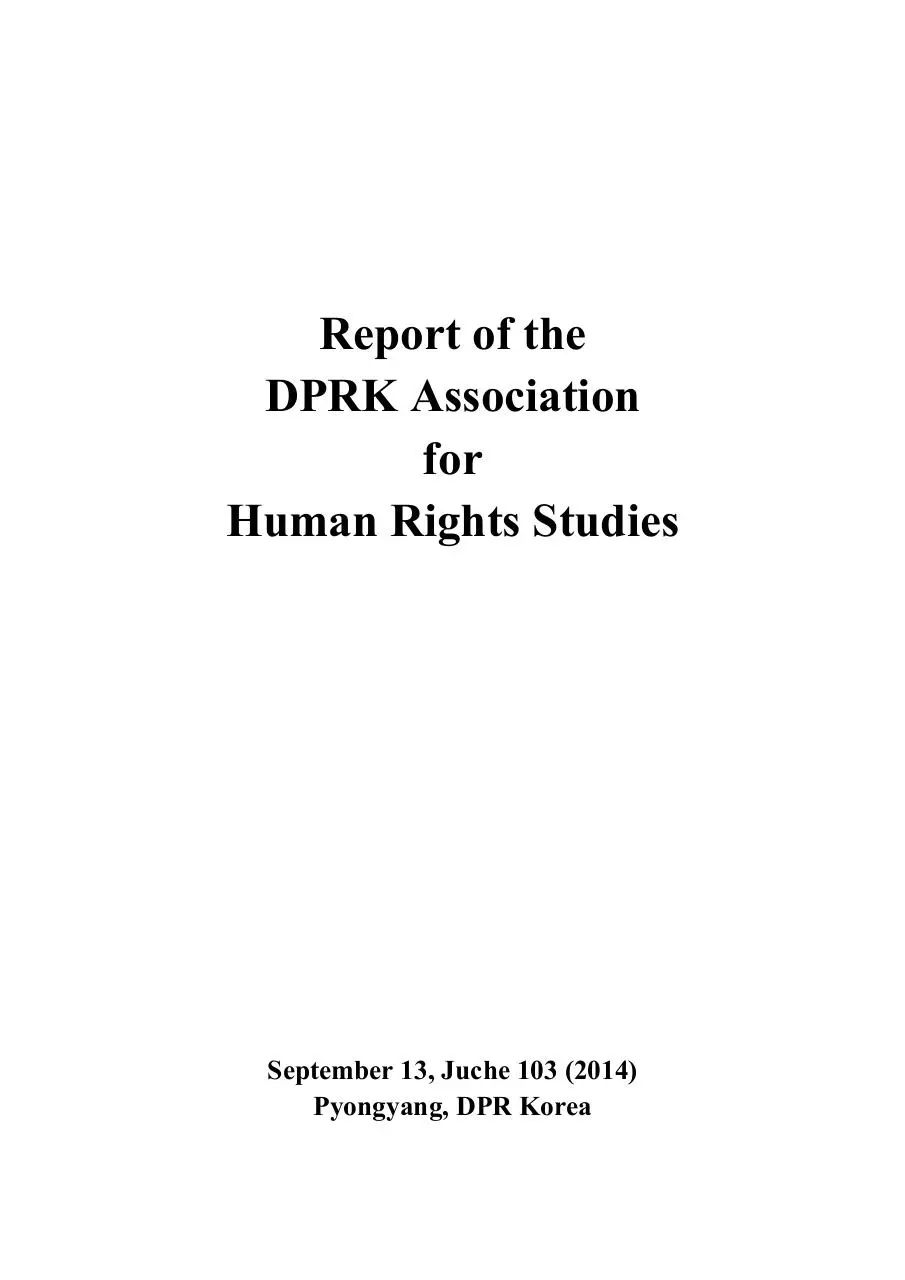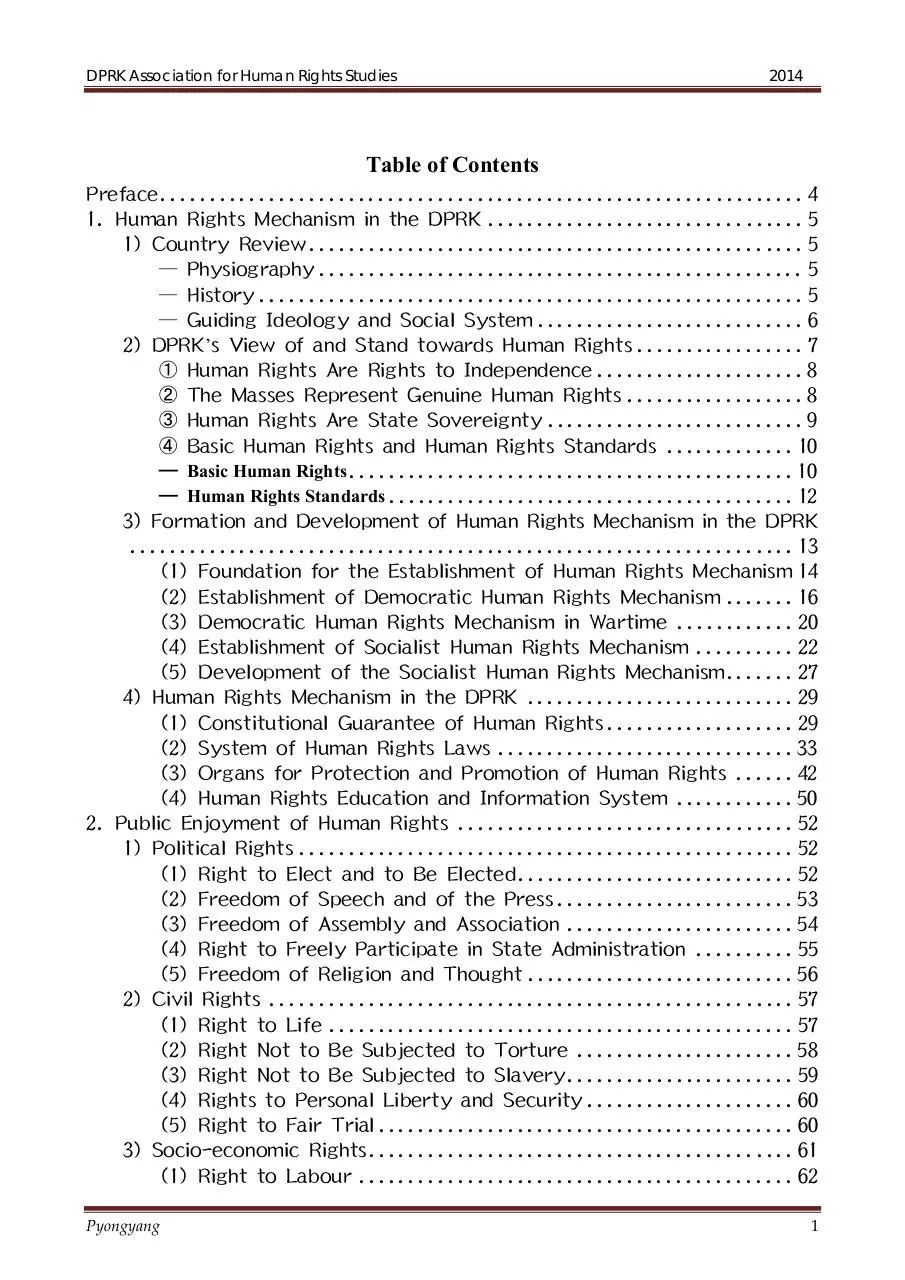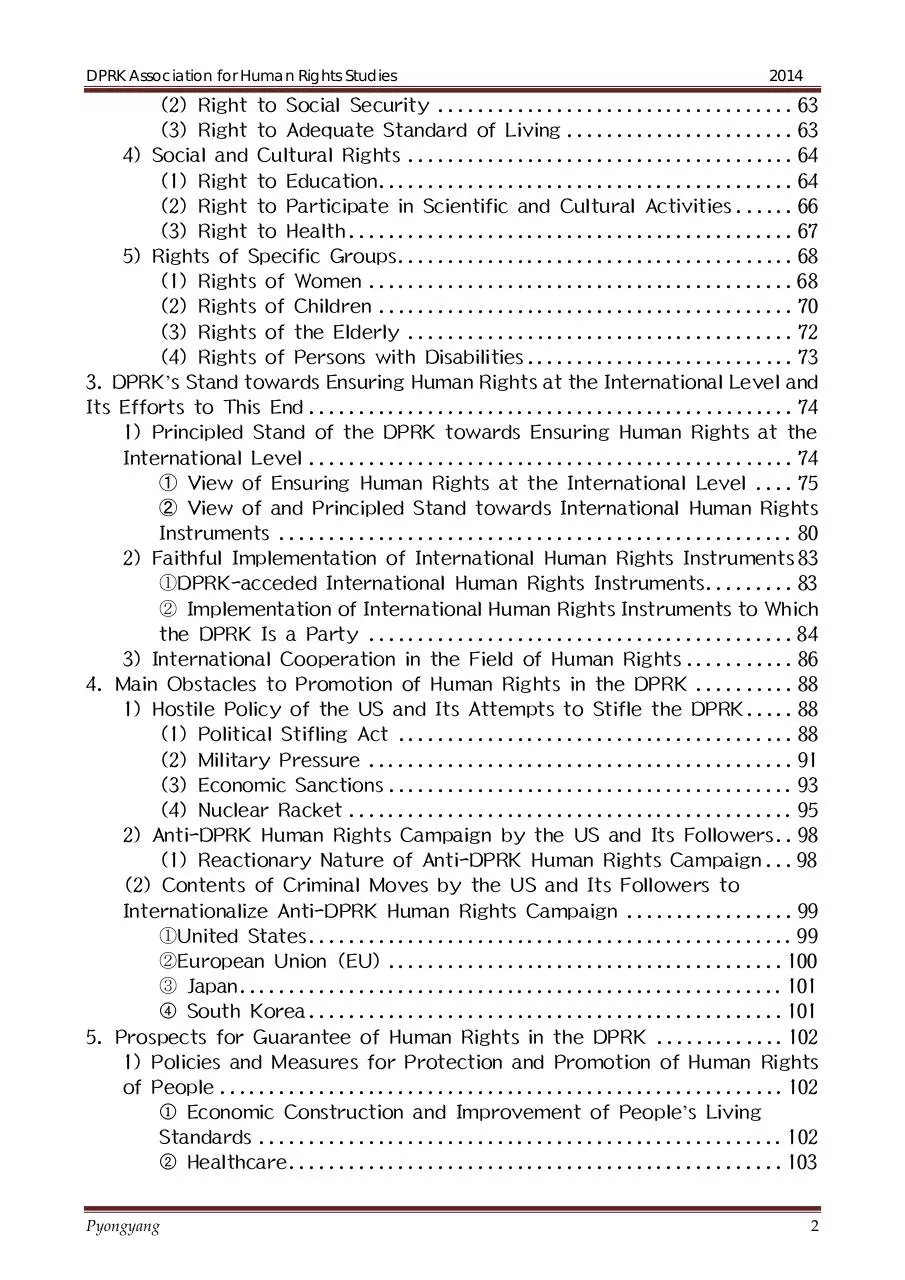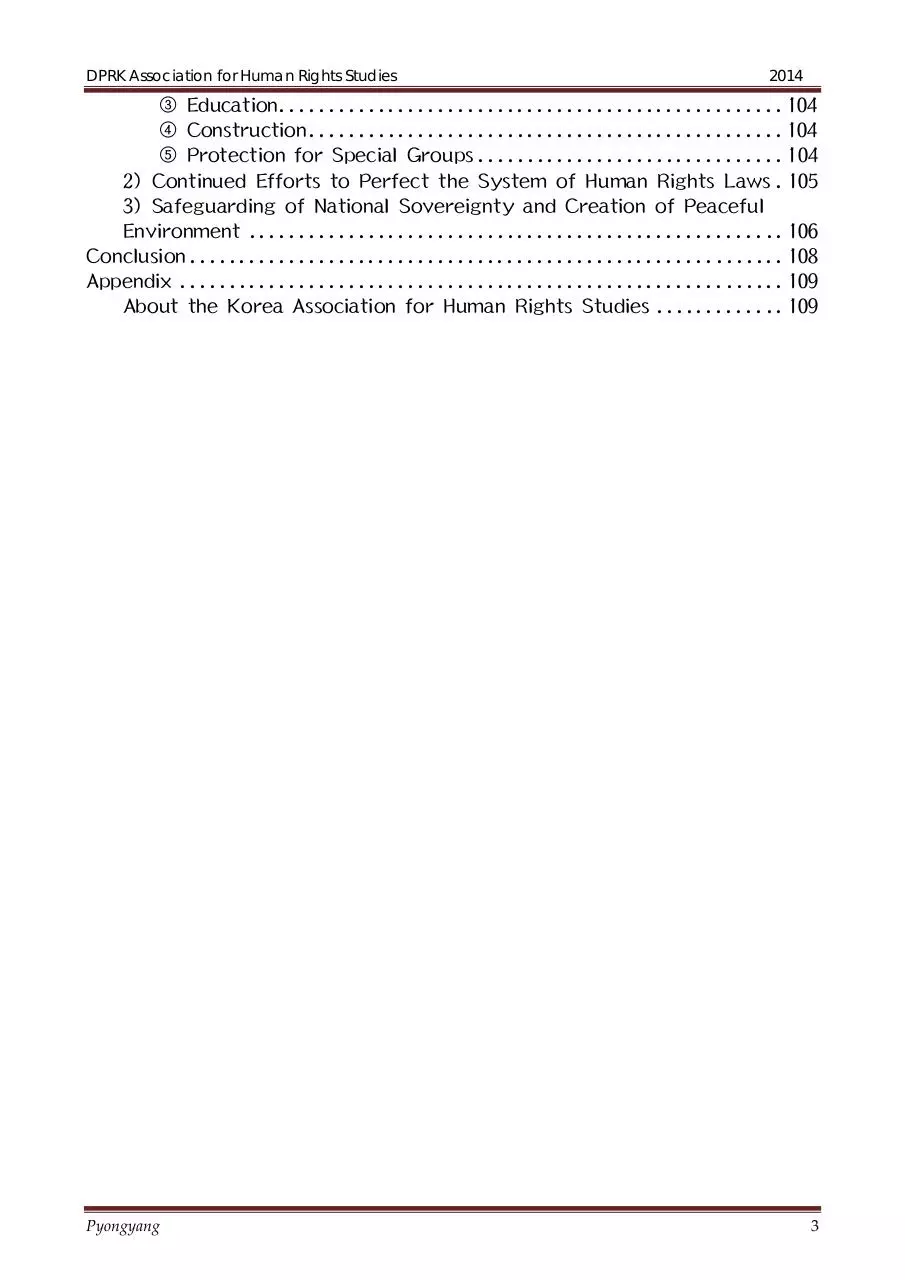DPRK Association for Human Rights (2014) (PDF)
File information
Title: Microsoft Word - 2014.10.11finalì˜ë¬¸ - 편집.doc
Author: Administrator
This PDF 1.4 document has been generated by PScript5.dll Version 5.2 / Acrobat Distiller 6.0 (Windows), and has been sent on pdf-archive.com on 29/03/2016 at 08:30, from IP address 71.202.x.x.
The current document download page has been viewed 931 times.
File size: 948.05 KB (111 pages).
Privacy: public file





File preview
Report of the
DPRK Association
for
Human Rights Studies
September 13, Juche 103 (2014)
Pyongyang, DPR Korea
DPRK Association for Human Rights Studies
2014
Table of Contents
Preface................................................................. 4
1. Human Rights Mechanism in the DPRK ................................ 5
1) Country Review.................................................. 5
─ Physiography ................................................. 5
─ History ....................................................... 5
─ Guiding Ideology and Social System ........................... 6
2) DPRK’s View of and Stand towards Human Rights ................. 7
① Human Rights Are Rights to Independence ..................... 8
② The Masses Represent Genuine Human Rights .................. 8
③ Human Rights Are State Sovereignty .......................... 9
④ Basic Human Rights and Human Rights Standards ............. 10
─ Basic Human Rights............................................. 10
─ Human Rights Standards ......................................... 12
3) Formation and Development of Human Rights Mechanism in the DPRK
................................................................... 13
(1) Foundation for the Establishment of Human Rights Mechanism 14
(2) Establishment of Democratic Human Rights Mechanism ....... 16
(3) Democratic Human Rights Mechanism in Wartime ............ 20
(4) Establishment of Socialist Human Rights Mechanism .......... 22
(5) Development of the Socialist Human Rights Mechanism....... 27
4) Human Rights Mechanism in the DPRK ........................... 29
(1) Constitutional Guarantee of Human Rights ................... 29
(2) System of Human Rights Laws .............................. 33
(3) Organs for Protection and Promotion of Human Rights ...... 42
(4) Human Rights Education and Information System ............ 50
2. Public Enjoyment of Human Rights .................................. 52
1) Political Rights .................................................. 52
(1) Right to Elect and to Be Elected............................ 52
(2) Freedom of Speech and of the Press ........................ 53
(3) Freedom of Assembly and Association ....................... 54
(4) Right to Freely Participate in State Administration .......... 55
(5) Freedom of Religion and Thought ........................... 56
2) Civil Rights ..................................................... 57
(1) Right to Life ............................................... 57
(2) Right Not to Be Subjected to Torture ...................... 58
(3) Right Not to Be Subjected to Slavery....................... 59
(4) Rights to Personal Liberty and Security ..................... 60
(5) Right to Fair Trial .......................................... 60
3) Socio-economic Rights........................................... 61
(1) Right to Labour ............................................ 62
Pyongyang
1
DPRK Association for Human Rights Studies
2014
(2) Right to Social Security .................................... 63
(3) Right to Adequate Standard of Living ....................... 63
4) Social and Cultural Rights ....................................... 64
(1) Right to Education.......................................... 64
(2) Right to Participate in Scientific and Cultural Activities ...... 66
(3) Right to Health ............................................. 67
5) Rights of Specific Groups........................................ 68
(1) Rights of Women ........................................... 68
(2) Rights of Children .......................................... 70
(3) Rights of the Elderly ....................................... 72
(4) Rights of Persons with Disabilities ........................... 73
3. DPRK’s Stand towards Ensuring Human Rights at the International Level and
Its Efforts to This End ................................................. 74
1) Principled Stand of the DPRK towards Ensuring Human Rights at the
International Level ................................................. 74
① View of Ensuring Human Rights at the International Level .... 75
② View of and Principled Stand towards International Human Rights
Instruments .................................................... 80
2) Faithful Implementation of International Human Rights Instruments 83
①DPRK-acceded International Human Rights Instruments......... 83
② Implementation of International Human Rights Instruments to Which
the DPRK Is a Party ........................................... 84
3) International Cooperation in the Field of Human Rights ........... 86
4. Main Obstacles to Promotion of Human Rights in the DPRK .......... 88
1) Hostile Policy of the US and Its Attempts to Stifle the DPRK..... 88
(1) Political Stifling Act ........................................ 88
(2) Military Pressure ........................................... 91
(3) Economic Sanctions ......................................... 93
(4) Nuclear Racket ............................................. 95
2) Anti-DPRK Human Rights Campaign by the US and Its Followers.. 98
(1) Reactionary Nature of Anti-DPRK Human Rights Campaign ... 98
(2) Contents of Criminal Moves by the US and Its Followers to
Internationalize Anti-DPRK Human Rights Campaign ................. 99
①United States................................................. 99
②European Union (EU) ........................................ 100
③ Japan....................................................... 101
④ South Korea ................................................ 101
5. Prospects for Guarantee of Human Rights in the DPRK ............. 102
1) Policies and Measures for Protection and Promotion of Human Rights
of People ......................................................... 102
① Economic Construction and Improvement of People’s Living
Standards ..................................................... 102
② Healthcare.................................................. 103
Pyongyang
2
DPRK Association for Human Rights Studies
2014
③ Education................................................... 104
④ Construction................................................ 104
⑤ Protection for Special Groups ............................... 104
2) Continued Efforts to Perfect the System of Human Rights Laws . 105
3) Safeguarding of National Sovereignty and Creation of Peaceful
Environment ...................................................... 106
Conclusion ............................................................ 108
Appendix ............................................................. 109
About the Korea Association for Human Rights Studies ............. 109
Pyongyang
3
DPRK Association for Human Rights Studies
2014
Preface
Today, in international society, hostile forces to DPRK are spreading false rumours about the
situation of DPRK, especially its human rights situation, causing wrong views and widespread
misunderstanding.
The US and its followers are persistently conducting a human rights campaign against the
DPRK, which is aimed at interfering in its internal affairs and overthrowing its social system by
publicizing the politically-motivated “human rights issue” of the DPRK on the international arena
and by bringing it even to the UN.
However, truth always prevails and nothing can cover it up.
The Korea Association for Human Rights Studies, with a view to helping the international
community have a correct understanding of the human rights situation in the DPRK, publishes this
comprehensive and detailed report on the history of the Government’s efforts for protecting and
promoting human rights, the present human rights situation, challenges, implementation of the
commitments to the international human rights instruments, and others.
The report has been worked out on the basis of an in-depth analysis of a colossal amount of
written materials including official documents, copies of international human rights instruments,
those of international human rights organizations, local human rights-related law and books, as well
as the present human rights situation in the DPRK.
Many have been involved in the preparation of the report and thanks are due to them all: such
state organs as the Presidium of the Supreme People’s Assembly, the Supreme Court, the Ministry
of Foreign Affairs, the Education Commission and the Ministry of Public Health; such
non-governmental organizations as the Korea Education Fund and the Korea Federation for the
Protection of Persons with Disabilities; lecturers and other scholars at Law College of Kim Il Sung
University and the Research Institute for Legal Affairs under the Academy of Social Sciences; and
many other individuals.
We admit that some parts of this report may be insufficient and incomplete for the readers. We
seek readers’ understanding on that.
Pyongyang
4
DPRK Association for Human Rights Studies
2014
1. Human Rights Mechanism in the DPRK
This part outlines the DPRK’s geographical location, history and social system, and explains the
major view and stand of the DPRK towards human rights and development of human rights
mechanism and the current situation.
1) Country Review
─ Physiography
Korea is situated in the northeastern part of the Asian continent. It consists of the Korean
peninsula and 3,452 islands around it, covering a total area of 223,370 square kilometres.
The northern part of the peninsula is bordered by China and Russia with the Amnok and the
Tuman rivers in between. The peninsula is surrounded by East Sea, West Sea and South Sea of
Korea, facing Japan to the east.
With more than 80% of its territory mountainous, it has high mountains, deep valleys, hilly
areas and thick forests. The six famous mountains, namely Paektu, Kumgang, Myohyang, Kuwol,
Chilbo and Jiri, are well known to the world.
As there are many rivers, lakes and springs, it is one of the countries with a high density of
water sources. And it has 179 high-quality mineral waters and hot springs.
Korea has four seasons of spring, summer, autumn and winter—each season distinctive and
characteristic.
Compared to the size of its territory, Korea is rich in mineral resources. Hence, it is said its area
should be measured by cubic metres, not by square metres.
In particular, Korea ranks among leading countries in the world in terms of deposits of iron ore
and magnesite, which are of high grade. The distribution area of limestone, the main raw material
for cement, covers 25~35% of its land mass and coal deposits amount to billions of tons. Marine
resources are also significant.
─ History
Korean ancestors had settled on the Korean peninsula from time immemorial; they created the
Taedonggang civilization, an independent sphere of civilization. This indicates that Korea is one of
the cradles of mankind.
In the early 30th century BC, Tangun, founding father of the Korean nation, opened a new era of
civilization by founding Ancient Joson with Pyongyang as its centre, which was the first ancient
state in east Asia.
Koreans are a homogeneous nation who have lived on the same territory from ancient times
maintaining the same bloodline, language and culture.
They are also a resourceful nation; they created material and cultural wealth through their
creative activities. They were the first to invent an iron-clad warship, metal types and astronomical
observatory. Numerous historical sites and relics including Koguryo tomb murals and historical
relics in Kaesong are on the list of world heritage sites.
In modern times, Korea became an arena for competition among the powers, ending up being
occupied by the Japanese aggressors in the early 20th century.
Pyongyang
5
DPRK Association for Human Rights Studies
2014
Under the leadership of General Kim Il Sung, the Korean people waged a 20-year anti-Japanese
revolutionary struggle to win back their country, thus liberating it on August 15, 1945.
With the founding of the Democratic People’s Republic of Korea (DPRK) on September 9,
1948, they could have a genuine government of their own for the first time in their history that
represents the interests of all the Korean people.
The US, which occupied the southern half of Korea under the cloak of “liberators” after World
War II, unleashed a war against the DPRK on June 25, 1950 to obliterate it in its cradle and reduce
Koreans to slaves. However, the Korean people beat the US which had boasted of being “the
strongest” in the world, demonstrating the spirit of heroic Korea.
Korea was divided into two parts first with the 38th Parallel as the dividing line after its
liberation from the Japanese military rule and the division was fixed into north and south Korea
after the Korean War with the Military Demarcation Line as a boundary, pursuant to the Korean
Armistice Agreement.
Upholding the banner of independence and self-reliance, the DPRK successfully carried out
post-liberation construction, anti-imperialist, anti-feudal democratic revolution, post-war
rehabilitation and socialist revolution, and established socialist system in August 1958 for the first
time in the East.
Afterwards, the DPRK launched the three revolutions—ideological, technological and
cultural—to strengthen the political base of the state and completed the historic cause of socialist
industrialization in such a short period as 14 years, laying a solid foundation of a socialist
independent economy.
Great efforts were made to raise the people’s living standards, resulting in a significant progress
to meet the needs for food, clothing, housing, education, cultural activities and health care. Taxation
was abolished and universal free medical care and compulsory free education were put in force.
Between the late 1980s and the early 1990s, socialism collapsed and capitalism revived in
several countries; even in this worldwide political turbulence, the DPRK remained steadfast to the
banner of socialism and strived to maintain its ideology and social system and make things easier
for the people.
By dint of Songun politics, it boosted its defence capabilities and successfully went through the
Arduous March and forced march, paving the way for a thriving socialist nation.
The 60 years of the DPRK may be called a history of self-reliance in which the people-centred
socialist system was established and strengthened under the wise leadership of President
Kim Il Sung and Chairman Kim Jong Il.
Had the DPRK backed down and turned to others in the face of unprecedented trials and
difficulties or given up the principle of self-reliance under the pressure of outside forces,
people-centred socialism would not have come into being and it would have disappeared with the
collapse of the global socialist bloc.
─ Guiding Ideology and Social System
The guiding ideology of the DPRK is the Juche idea.
In a nutshell, the Juche idea means that man is the master of everything and decides everything.
In other words, it means that man is responsible for his own destiny and also has the capacity to
shape his destiny.
Pyongyang
6
DPRK Association for Human Rights Studies
2014
The Juche idea is the most scientific and revolutionary guiding ideology as it guarantees the
status of the people as masters of the revolution and construction politico-ideologically, materially
and militarily by ensuring that the principles of independence, self-reliance and self-defence are
observed in the activities of the state. It also sees to it that independence of the masses is realized in
all aspects of social life and the revolution and construction advance to victory.
All the achievements made by people of the DPRK in their efforts to build and strengthen
socialism testify to the successful line and policies of the DPRK guided by the Juche idea and the
advantages and solidity of the DPRK Government.
The Juche idea is the ideology of believing in people as in heaven. It is a political doctrine and
principle of activities for the DPRK Government guided by the Juche idea to take full responsibility
for and protect people’s destiny, make flowers bloom even on the rock if the people want, and spare
nothing for the promotion of their well-being.
The DPRK Government guided by the Juche idea is committed to representing people’s
independent rights, mobilizing their creative abilities and activeness, taking charge of their
livelihood and protecting their independent and creative life.
The state and social system of the DPRK which has embodied the Juche idea is people-centred
as people are the masters of everything and everything serves them.
Its political system makes people masters of state power, serves them and bestows priceless
political integrity upon them. Its economic system ensures people an independent and creative
labour, and an affluent and civilized life. Its cultural system enables people to create and enjoy
socialist culture.
All the lines and policies adopted and implemented in the people-centred state and social system
are directly related to ensuring people’s independent rights and directed towards give an absolute
priority to their interests and convenience.
Under such a social system, the people are enjoying a worthwhile and happy life, experiencing
no socio-political unrest, in a harmonious community where people help and lead one another true
to the slogan, “One for all and all for one”.
Convinced that their state and social system based on the Juche idea is the most advantageous
and people-oriented one that ensures their genuine freedom and rights, the people of the DPRK
absolutely supports it and are striving to further consolidate it under the seasoned leadership of their
supreme leader Kim Jong Un.
2) DPRK’s View of and Stand towards Human Rights
At present, countries and nations have their own views of and stands towards human rights, and
related international instruments fail to provide a unified and correct definition of human rights.
Furthermore, certain countries and dominating forces are dictating their own values and wrong
views on human rights upon to other countries, only to harm the latter’s sovereignty and human
rights.
Under these circumstances, without a proper view of human rights, a state can neither ensure
genuine human rights for its people nor foil the arbitrariness and high-handedness of dominating
forces. It also can’t promote human rights internationally.
Placing people at the centre of all considerations and on the basis of the actual realities of the
country and practical experience, the DPRK endeavors to protect and promote genuine human
rights with a proper view of and stand towards human rights.
Pyongyang
7
DPRK Association for Human Rights Studies
2014
The following are the DPRK’s main view of and stand towards human rights:
*The view and stand are based on the Juche idea, a man-centred most scientific ideology
geared to the protection and promotion of human independence.
① Human Rights Are Rights to Independence
As human rights literally mean the rights of man, the concept of the rights should be defined
proceeding from his inherent nature.
Independence is intrinsic to man, and the right to realize it is just the right to independence, or
human rights.
Independence is an attribute of a social being desirous of living and developing independently
as the master of the world and his/her destiny.
Independence is the life and soul of man, a social being. Man can maintain his dignity and
worthiness as a social being and live a worthwhile life only when he achieves independence.
If man is to achieve his independence, he needs to have the right to realize it. It is because
man’s right embodies his wish and demand, and it requires that the state guarantees it.
Independent rights reflect and guarantee the independent will and demand of man who wants to
live and develop free from all sorts of restriction and subjugation as the master of the world and his
own destiny.
The rights that do not embody independent will and demand of man or fail to realize them are
not human rights in a true sense. This shows that any discussion of human rights apart from the
independent nature of man is meaningless, and that human rights cannot be protected and promoted
unless man’s independence is realized.
Man’s activities to realize his independence cover all aspects of social life. So human rights are
independent rights that enable man to hold his position and play the role as the master in all fields
of social life including politics, the economy and culture.
In the final analysis, when human rights are regarded as independent rights, the efforts to realize
them are just. However, advertisement of human rights proceeding from an unscientific view of
man’s nature cannot be justified, no matter which country clamors for them or which international
instrument confirms them.
② The Masses Represent Genuine Human Rights
Human rights are defined in international human rights instruments as the “rights of all
members of the human family” or “rights of all human beings”. It is understandable that the
definition of human rights is given in such broad terms since it should be acceptable to all states and
nations with different social and political systems and different levels of development.
Of course, such definition has some significance in avoiding argument and dispute among
different states and nations concerning the concept of human rights as well as in leading them to
compromise and agreement.
However, the failure to provide clear-cut definition of human rights in the international
instruments gave room for different countries to interpret it in their own ways.
Pyongyang
8
Download DPRK Association for Human Rights (2014)
DPRK Association for Human Rights (2014).pdf (PDF, 948.05 KB)
Download PDF
Share this file on social networks
Link to this page
Permanent link
Use the permanent link to the download page to share your document on Facebook, Twitter, LinkedIn, or directly with a contact by e-Mail, Messenger, Whatsapp, Line..
Short link
Use the short link to share your document on Twitter or by text message (SMS)
HTML Code
Copy the following HTML code to share your document on a Website or Blog
QR Code to this page

This file has been shared publicly by a user of PDF Archive.
Document ID: 0000354112.